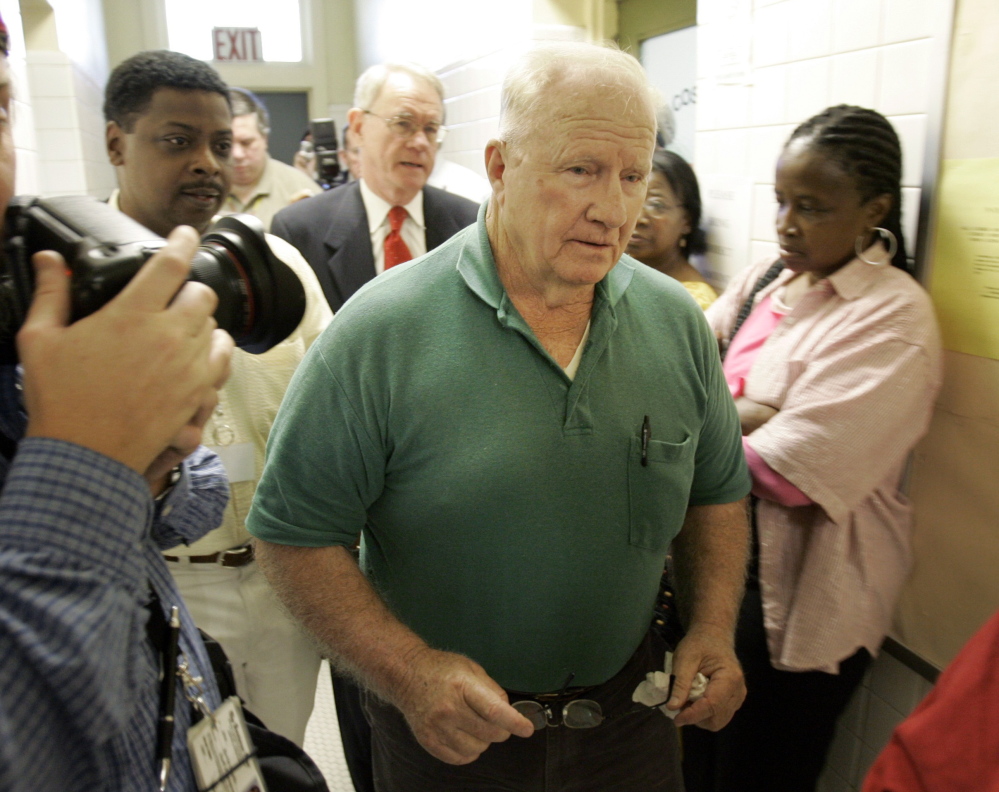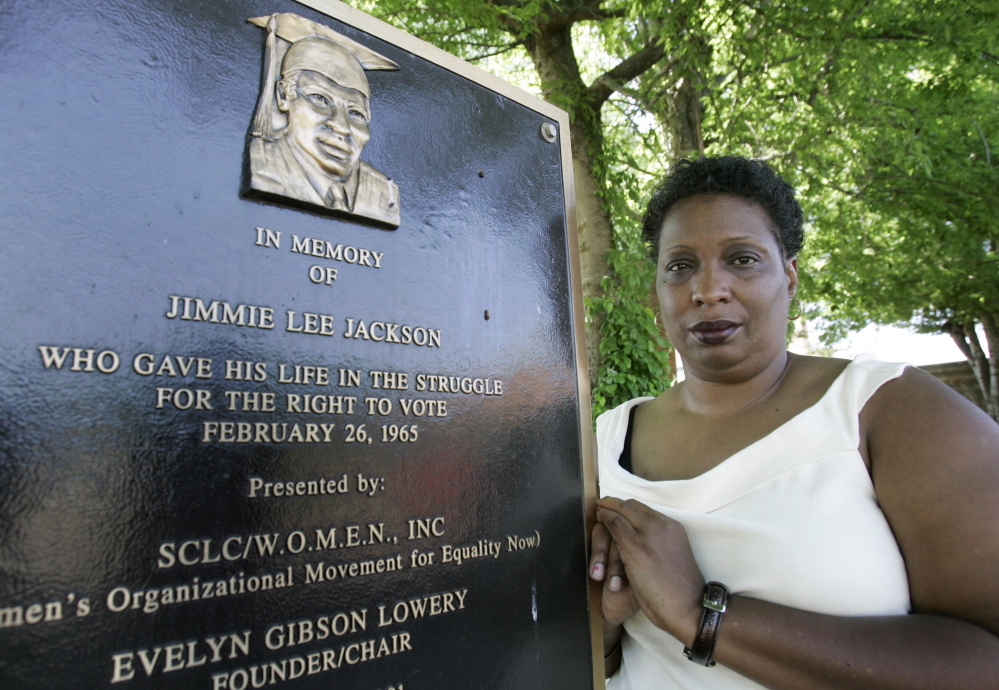During a peaceful civil rights march on the night of Feb. 18, 1965, the lights went out on the streets of Marion, Alabama.
In the melee that followed, billy-club-wielding law enforcement officials went on the offensive against hundreds of marchers. One unarmed black demonstrator, Jimmie Lee Jackson, raced into a nearby restaurant, where a state trooper thrust him against a cigarette machine and another fatally shot him twice in the belly.
The Rev. Martin Luther King Jr. eulogized Jackson as “a martyred hero in the holy crusade for human dignity.” The slaying helped spark a bloodier clash, in nearby Selma, the next month. Captured on national TV, the violent suppression of the Selma protesters galvanized congressional support that year for the Voting Rights Act, which prohibited racial discrimination at the polls.
The full identity of Jackson’s killer was publicly shrouded for four decades – until the former trooper, James Bonard Fowler, revealed himself to an Alabama journalist. He presented the shooting as an act of self-defense and said he wished to tell his side of the story.
Fowler’s self-revelation, however, came at a time when a cluster of aging Klansmen were being prosecuted and convicted for decades-old crimes, including church bombings and assassinations, and renewed interested in the Jackson case. A newly elected district attorney, who was black, led the charge. A grand jury in Perry County, where Marion is the county seat, took two hours to indict Fowler on a murder charge in 2007.
In 2010, he pleaded guilty to misdemeanor manslaughter, and he was sentenced to six months in jail.
Fowler, 81, died July 5 in Geneva County, Alabama, said John Fleming, the journalist who conducted the critical interview with the former state trooper a decade ago. The cause was not immediately available, said Fleming, a former editorial page editor for the Anniston Star in Alabama who is executive editor of the Center for Sustainable Journalism in Kennesaw, Georgia.
Fowler’s imprisonment was the last twist in a twisty life. After being dismissed from the state police in 1968 for severely beating his supervisor, Fowler distinguished himself in Vietnam War combat and received high honors for valor.
He remained for years in Southeast Asia. In the late 1980s, he helped U.S. military prosecutors expose an alleged murder-for-hire plot that involved Army officers. A few years later, Thai authorities arrested him for heroin trafficking, and he spent about five years in prison before his release in 1996. In recent years, in the quiet of rural Geneva County, he was a farmer.
James Bonard Fowler, widely known by his middle name, was born in Geneva County on Sept. 10, 1933. He was a football player in high school, then served in the Navy before attending the University of Alabama in the late 1950s. He joined the state troopers in 1961, according to state personnel records reviewed by The Associated Press.
He was present in the blockade of law enforcement officials in Marion in 1965. Protesters had gathered in outrage over the jailing of a civil rights activist for disorderly conduct and other charges stemming from voter-registration efforts.
The march lasted about a block, from a Methodist church where protesters had congregated, to the town jail. Police authorities ordered the marchers to disband, then the nearby street lights went dark.
Jackson, a 26-year-old laborer, spirited to the cafe for safety, along with his mother and grandfather. State troopers rushed in and began beating customers, and Jackson tried to shield his mother from the clubs.
After being shot, Jackson was taken to a hospital in nearby Selma and died from his wounds eight days later.
A grand jury declined to indict Fowler in the fall of 1965, and he was identified in the media only as “a trooper Fowler.” He was promoted to the Birmingham, Alabama, office but trouble continued to shadow him. In 1966, claiming self-defense, he fatally shot a black man in custody in nearby Alabaster.
According to public documents later unearthed by the Anniston Star, Fowler was dismissed as a state trooper in 1968 after bloodying his superior officer over a mediocre job review. He then joined the Army, following in the footsteps of a brother who had been killed in Vietnam. Fowler received two awards of the Silver Star and the Purple Heart, the Star reported.
His post-Army years in Thailand were murky. He somehow became involved with an Army sergeant who wanted Fowler to kill his captain. The sergeant was convicted in 1988, with Fowler providing crucial testimony; a military appeals court overturned the verdict years later, the Star reported.
After his own release for narcotics trafficking in Thailand, Fowler returned to Alabama and lived with his wife, a native of Burma.
Fleming, then a journalist with the Star, had spent years chipping away on an investigation of Jackson’s death and was granted an interview in 2005 with Fowler, who said Jackson was to blame for trying to grab the trooper’s gun from its holster.
“Jimmie Lee Jackson was not murdered,” Fowler told Fleming. “He was trying to kill me and I have no doubt in my mind that, under the emotional situation at the time, that if he would have gotten complete control of my pistol that he would have killed me or shot me. That’s why my conscience is clear. But on TV on documentaries you watch, they say that Jimmie Lee was murdered by an Alabama state trooper.”
The killing was dramatized in the 2014 film “Selma.” A complete list of Fowler’s survivors was not available.
In his interviews with Fleming, Fowler professed he was not a racist. He said he had been born and raised among blacks but was unnerved by the civil rights movement. He said he respected many black leaders, including South African President Nelson Mandela and Army Gen. Colin Powell.
But, Fowler said, race mixing was toxic for white and black America. “They always fared better when they stayed in their place,” he said.
Send questions/comments to the editors.




Success. Please wait for the page to reload. If the page does not reload within 5 seconds, please refresh the page.
Enter your email and password to access comments.
Hi, to comment on stories you must . This profile is in addition to your subscription and website login.
Already have a commenting profile? .
Invalid username/password.
Please check your email to confirm and complete your registration.
Only subscribers are eligible to post comments. Please subscribe or login first for digital access. Here’s why.
Use the form below to reset your password. When you've submitted your account email, we will send an email with a reset code.